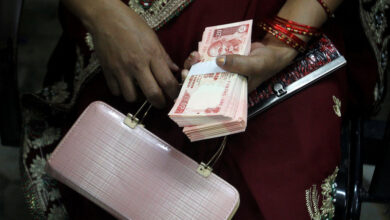Exclusive-South Korea’s pension fund, central bank to extend FX swap line -sources

FILE PHOTO:The skyline of central Seoul is seen during a foggy day in Seoul March 4, 2015.Picture taken on March 4, 2015. REUTERS/Kim Hong-Ji /File Photo
USD/KRW
-0.05%
Add to/Remove from Watchlist
Add to Watchlist
Add Position
Position added successfully to:
Please name your holdings portfolio
Type:
BUY
SELL
Date:
Amount:
Price
Point Value:
Leverage:
1:1
1:10
1:25
1:50
1:100
1:200
1:400
1:500
1:1000
Commission:
Create New Watchlist
Create
Create a new holdings portfolio
Add
Create
+ Add another position
Close
By Jihoon Lee and Yena Park
SEOUL (Reuters) – South Korea’s National Pension Service (NPS) and central bank are in talks to extend their foreign exchange swap programme that was due to expire in December, according to two government sources with direct knowledge of the matter.
« The two institutions seem to be in agreement with each other to extend. They are considering it positively, » a welfare ministry official told Reuters.
Another official at the welfare ministry, which oversees the NPS’s fund management and policies, also said extension is currently under discussion.
The NPS, the world’s third-largest public pension fund, and the Bank of Korea (BOK) established in April a foreign exchange swap line of $35 billion to ease pressure on the local currency from the pension fund’s growing investments abroad.
The swap allows the NPS to use the BOK’s foreign exchange reserves in times of currency market volatility, removing one of the heaviest sources of pressure on the won in the spot market.
The new amount and period are not yet determined but will likely be in line with the existing contract, one of the welfare ministry officials said.
The move comes amid concerns among foreign exchange traders that the local currency would face additional pressure if the pension fund, a major market player with huge demand for dollars, had to return.
The won has weakened 3% against the dollar so far this month, sharply reversing the course from November, when it posted its biggest monthly gain in a year. For 2023, the won has so far fallen 5%, on track for its third straight yearly loss.
« It is a news if it does get extended, and it is still a news even if it doesn’t, » one currency dealer said.
The won, one of the most volatile emerging market currencies, still faces external headwinds from uncertainty over the U.S. monetary policy and a sluggish Chinese economy, traders say, with the country’s exports expected to make only a modest recovery.
In Reuters’ request for comment, an official at the BOK said it was discussing with the NPS about extending the swap line. The NPS also confirmed they were in discussion.
The NPS has been increasing its overseas investments for higher returns, adding to demands for dollars.
As a result, the NPS has come under criticism for aggravating declines in the won with skewed dollar demand in the market.
During the dollar’s rally in the three months to October, the BOK’s foreign exchange reserves dropped by $9 billion to the lowest level since mid-2020.
The NPS bought $8 billion worth of foreign stocks and bonds during that period, central bank data showed on Friday.
The monthly average buying of foreign stocks and bonds for the January-October period stood at $2.6 billion, bigger than any other year on record.
Soon after Reuters reported on the swap extension, the won gained as much as 1.21% against the dollar in the onshore spot market, sharply rebounding from a more than three-week low.
The NPS held a total of 983.4 trillion won ($746.11 billion) in financial assets as of end-September, 51.6% of which was in foreign assets. It plans to raise the ratio to 60% by 2028.
($1 = 1,318.0400 won)







